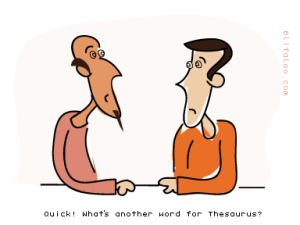What’s In a Word? That Depends.
As I skip around the internet looking at other blogs, I’m struck by the incredible variety … variety of content, variety of style and, in particular, variety in the quality of writing. Some is pretty good, but most, I’m afraid, is marginal at best and just awful at worst.
Are kids taught grammar today? Do they spend any time talking about the nuances that provide the difference between two words with very similar meanings? I would guess not.
All of which makes me grateful all over again for the class time I spent during my high school years with an extraordinary man and exceptional English teacher. Quite apart from the formal instruction he gave us, Norris Orchard had a standing offer of $25.00 – a princely sum back in the 50s – if any of his students could come up with perfect synonyms. Emphasis on “perfect”.
 It was his contention, you see, that no two words in the English language have exactly the same meaning. To meet his definition of “perfect synonym”, those two words could be substituted for each other in any sentence without altering the meaning of that sentence in any way.
It was his contention, you see, that no two words in the English language have exactly the same meaning. To meet his definition of “perfect synonym”, those two words could be substituted for each other in any sentence without altering the meaning of that sentence in any way.
I remember reading somewhere that the average literate English-speaking person can make use of something like 400,000 different words. And, according to Norrie Orchard, of all those words, no two mean exactly the same thing. That’s quite extraordinary, if you stop and think about it.
I remember running up to him during lunch one day and breathlessly offering menace and threat as my entry in the $25 sweepstakes.
“Not bad,” said Norrie. “But you can’t send a menace through the mail.”
Damn!
But then he stopped and thought a bit. “Unless, of course,” he added, “the postal authorities would accept a package containing a five-year old boy.”
What a guy! What he gave me over four years was worth a whole lot more than $25.




Very interesting. I have never run across the use of grail as a plate.
How about “forbid” and “prohibit”
Very interesting. I have never run across the use of grail as a plate.
How about “forbid” and “prohibit”
Did a little checking and “grail” (as distinct from “the HOLY grail”)is desribed as a plate or platter in it’s original use. A “chalice” is a cup … a drinking vessel. Sorry, looks like Norrie Orchard’s $25 is safe. But it IS a fun exercise, isn’t it!
What an interesting challenge. Perhaps this is a reflection of how my my mind works, but when I went thinking of perfect synonymns, what I first came up with were several highly impolite words for both the male and female sexual organs.
They do seem to fit the criteria for perfect substitution of each other.
Upon further thought, my printable submission will be the words “grail” and “chalice.” I cannot think of any sentence where one cannot be substituted for the other without a change of meaning. Hmmm… triple negative… bad English that…
Excellent post and thanks for writing it. We were stationed in England some time ago, and I was amazed at how well spoken Brits are. It’s a pleasure to listen to them converse.
Rude to eavesdrop, yes, but what you don’t hear is, like, uh, this one guy? he says, like…
We are, I fear, in a shrinking minority. But let us fight the good fight.
I have to agree completely, I am glad I stumbled upon your blog. Our language is so important. Like great art can range from monochromatic simplicity to elaborate designs utilizing every color of the rainbow, knowing how to use language, and having many many ‘colors’ to work with gives a conversation it’s poignance and depth…